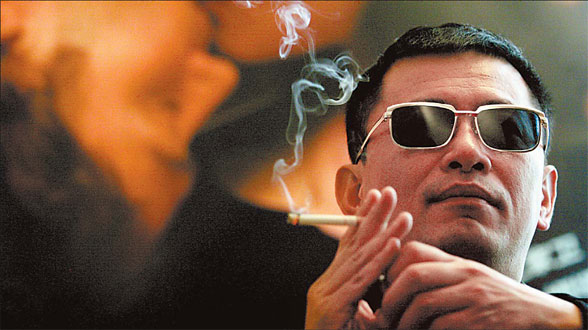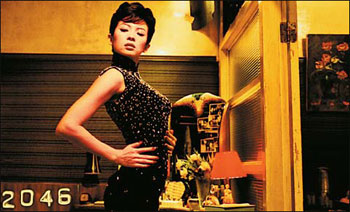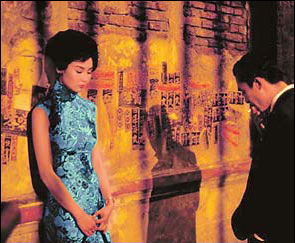Man behind the shades
|
Hong Kong film director Wong Kar-wai. Jiang Dong |
Dressed in his trademark sunglasses and black suit, 50-year-old Wong Kar-wai, whose latest offering My Blueberry Nights starring Norah Jones and Jude Law premiered last month, stepped into the interview room.
"Can I smoke?"
His voice was gentle. He lit a cigarette but most of the time just let the smoke curl around him, instead of smoking. Behind the black glasses and the gray smoke, he seemed as mysterious as the love stories in his films. Perhaps, it is his way of getting into the mood for an interview.
China Daily: How can someone wearing sunglasses shoot films with such beautiful colors?
Wong Kar-wai: My lenses are called "true color" and were originally used by pilots who needed to see clearly but avoid strong sunlight. Through my glasses, the world is no different from what you see. The shading and contrast of colors are the same. You are in a red sweater, right?
CD: You have been quoted as saying your sunglasses are like Charles Chaplin's moustache, straddling a line between life and work. Are sunglasses part of your image?
Wong: When people see the glasses, they will know this is the director Wong Kar-wai. The sunglasses are my "working clothes." That's all.
CD: You like to set your films in eateries, like fast food shops, Western restaurants, or a wonton stall on the street. Why do your films focus so much on food?
Wong: Food is something we all understand, like desire between men and women, because they are both the call of nature, our bodies.
I've been interested in the connection between food and desire. There is a book in which a woman finds her husband is having an affair and runs into a restaurant after aimlessly drifting around on the street.
She orders all the food she hates. When she feels the pain of eating something she does not enjoy at all, her heart's pain finds a specific outlet. For me, food is a method to express the characters' feelings and desires.
CD: Food is also your own emotional outlet?
|
A scene from 2046 featuring Zhang Ziyi. File photo |
Wong: My hobby outside film is eating. When I feel depressed, I eat. Anything is OK, just something to put in your mouth, to exteriorize your feelings.
CD: Jude Law, Norah Jones, Natalie Portman and David Strathairn appear in My Blueberry Nights, while Tony Leung and Maggie Cheung are familiar faces in your works. How do you persuade these great actors to work for you?
Wong: I do not "persuade" them. I tailor a role according to the actor I want to cast, while most directors find an actor for a role. Which method do you think the actors will like more?
Another important reason is that they have seen my films. They know I am a net, filtering uninteresting things and keeping only the good aspects.
The best director, I think, knows how to make the actors relax. The actors will feel they are in front of a good doctor, so they do not mind presenting their problems.
CD: Rumor has it that you tell every actor or actress he or she is the leading role to win them over. Is that true?
Wong: Do you think they would be that stupid? I will never say to anyone: "You are absolutely my first leading actress, all the others are not." The actors know each other. They know who else is in the project. They can talk.
They are all very experienced. They will accept the role if they think it is a challenge. For example, Rachel Weisz thinks a role is good if it is something she has never tried before.
CD: Another rumor says that you promise every actor you will present a different him or her. Is that right?
|
Tony Leung and Maggie Cheung star in In the Mood for Love. File photo |
Wong: Filming is cooperative, not simply what I want to present. I will tell the actors, I am a chef, but you should give me enough ingredients. You can open your pocket, showing me what you have. If you have only one ingredient, I can only make one dish.
CD: After you quit university as an art design major, you worked as a screenwriter for about eight years. Why don't you give actors a complete script?
Wong: You know, in the 1990s, a film could be completed in one week in Hong Kong. If I had a complete script, someone would have finished four projects before I finished one. I started as a playwright, so I know how the story goes in my mind.
CD: How do you comfort the actors when they find their performance is edited to a short part?
Wong: We know Zhang Yimou works in a different style. He has complete scripts and very good preparations, but do all the things he shoots appear in the final work? It's like after you buy a cabbage in the market: Will you use it whole when you cook it? You have to give up something to ensure the film as a whole is good.
(China Daily 01/09/2008 page18)

















